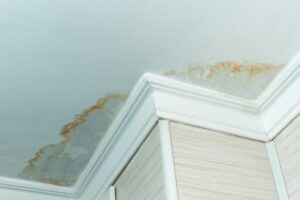This question gets at the heart of an issue we call “leak detection.” In the plumbing industry, this is a difficult subject to approach, because everyone has their own methods and strengths when it comes to finding a leak and having it dealt with.
Some folks, for instance, have very sharp ears and can detect even the slightest “dripping” sound coming from their basement in the middle of the night. Other people might be losing their hearing, but they’ve got great vision where they can see the moisture of a pinhole leak developing on a pipe.
In fact, there are several different methods for water leak detection in Cedar Rapids, IA, and many of them can be done either by professionals or for free at home. We’re going to go over a few methods of water leak detection, from audio cues to exact measurements using your water meter. Then, we’ll let you decide if you should call us for professional services when it’s finally time to plug that leak.
Visual Cues
First things first, try to do a run-through of your home’s plumbing system to see if you detect any visual cues that a leak is occurring. This can be simple, since leaks take many different forms and most of them are pretty easy to spot.
Gushing leaks are probably the easiest to spot because they can be largely problematic for your way of life and are almost impossible to miss.
Smaller leaks like pinhole leaks that are due to corrosion can be harder to spot, but nevertheless, we urge customers to try inspecting their plumbing systems for signs that a leak is occurring. Anything from dripping water to slight discoloration on a pipe can signal that something is wrong.
Audio Cues
Audio signals are one of the other main ways that customers can tell when there’s a leak in their home. The classic “dripping noise” is one of the main ways that leaks are detected by homeowners, as well as larger flowing noises from gushing leaks.
Pay especially close attention to your walls. If you hear dripping or gushing water coming from your walls, then chances are likely you have a leak that you otherwise can’t see. Pipes run through walls and ceilings, and it’s entirely possible to have a leak in a place that you wouldn’t be able to reach with conventional methods.
Wetness and Mold
Do you notice any wet spots in your home? Or perhaps you’re seeing more and more mold growth throughout your basement or crawlspace? These can all be signs that you’ve got a nasty plumbing leak that needs to be addressed.
Water leaks can lead to stagnant pools of water and higher humidity, meaning mold will more likely grow and infest your home.
Use Your Water Meter
When all else fails, you can use your water meter to detect even the smallest leaks in your home.
Shut off all the water-using appliances in your home and head outside to examine the water meter. If it’s still showing that your home is using water, then you can bet there’s a leak somewhere that you otherwise can’t detect. Once you notice this, call our team to have the leak fixed.
At Dalton Plumbing, Heating, Cooling, Electric and Fireplaces, Inc., your comfort is our promise! To set up an appointment in the Cedar Rapids area, give us a call at the number above, email customerservice@daltonphc.com or schedule an appointment online.

